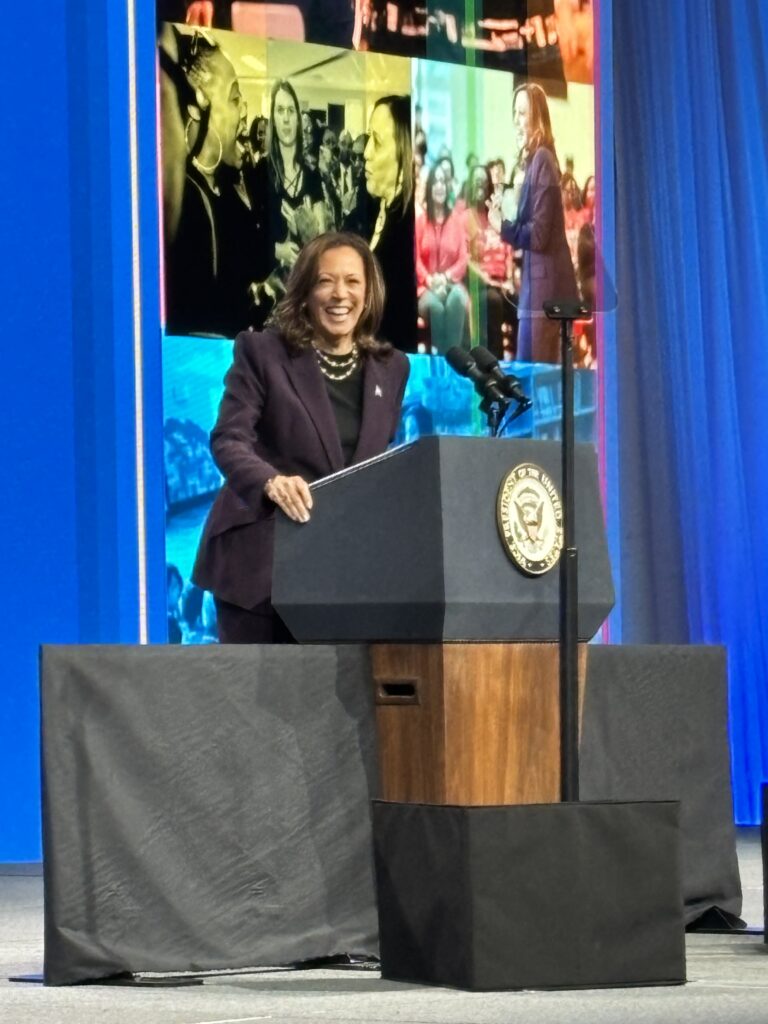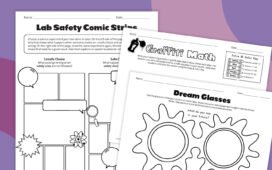As a former teacher, I was thrilled when I heard that Vice President Kamala Harris would be speaking at the American Federation of Teachers Convention here in Houston. Knowing this was one of her first speeches as a presidential candidate, and knowing the absolute train wreck of the state takeover of Houston I.S.D. this past year, I knew I had to be there.
Dodging the rain, I headed to Houston’s George R. Brown Convention Center early this morning and went through press check-in. While waiting, I chatted with fellow teachers, AFT staff, and media personnel about their expectations for Harris’ speech. Many expressed a mix of excitement and curiosity about her plans for education.

Finally, once the delegates from the AFT convention had taken their seats, AFT president Randi Weingarten took the stage and introduced Vice President Kamala Harris.

Here are my five biggest takeaways from her speech.
1. Teachers are ready for change.
The energy in the room was palpable. Harris’ acknowledgment of the struggles teachers face and her call for systemic change resonated deeply.
“In this moment, we are in a fight for our most fundamental freedoms,” Harris said. “And to this room of leaders, I say bring it on. Bring it on. Bring it on.”
The crowd’s chants of “Bring it on!” in response made it clear: Teachers are ready for change.
2. Harris is no stranger to advocating for teachers.
I knew Kamala Harris had a strong history of supporting education initiatives. In her career, she has advocated for universal preschool, teacher pay raises, and free higher education. She’s been a strong advocate for desegregation, and according to Education Week, “has endorsed bills to improve STEM education for girls and underrepresented minorities, and give school districts funding to support aligning the school day with family work schedules and building stronger relationships with families.”
In her speech today, Harris focused on student debt forgiveness, particularly for teachers struggling to pay off student loans over decades. Quoting a teacher she spoke with, Harris said, “Will I have to leave this job to pay the bills?” A sentiment nearly every teacher I know has grappled with at one time or another.
She also mentioned the threats to teachers’ safety, humanity, and professionalism in the form of gun violence, anti-LGBTQ+ legislation, and book bans. Clearly, Harris knows what teachers are facing.
3. There was a big focus on the future.
“Today we face a choice between two very different visions for our nation, one focused on the future and the other focused on the past,” Harris said. “And we are focused on the future.”
With so much negativity in teachers’ rearview mirrors these last few years—going from heros to zeros during COVID, book bans, hostility from communities, and even violence in some cases—teachers are more than ready to look ahead.
“We are not going back. No,” Harris said. “We will move forward.”
4. Another big focus: our national character.
Teachers know better than almost anyone that achievements mean very little if they’re born from hate, hostility, or ignoring the rules. Harris spoke to this notion during her speech:
“We each in our country face a question, that question being what kind of country do we want to live in?” Harris said. “A country of freedom, compassion, and rule of law? Or a country of chaos, fear, and hate? The beauty of our democracy is that we each have the power to answer that question when we vote. And when we vote, we make our voices heard.”
5. It’s significant that one of Harris’ first speeches as a presidential candidate was to teachers.
I found myself getting choked up as I watched Harris in the final moments of her speech.
Teachers aren’t used to being “seen.” Sure, we have Teacher Appreciation Day and the occasional email from a former student. But more often than not, apart from the students whom we impact directly, we’re sort of in the shadows. I think most of the public expects that we’ll show up, no matter how insulting the pay is or how little support we get.
To have the current vice president and presidential candidate address educators directly, Harris signaled to teachers, “I see you. Your problems matter to me, and I hear them.”
Some say politics and political discussions have no place in education. But that’s fundamentally untrue. Every part of education—from our curriculum to our pay to the number of students in our classrooms and books in our libraries—is based on political decisions. Teaching in itself is a political act.
I won’t tell you who to vote for. But I will tell you this: If education is a cause on the ballot that matters to you at all, please, please show up to the polls in November.
I know who has my vote.








Recent Comments